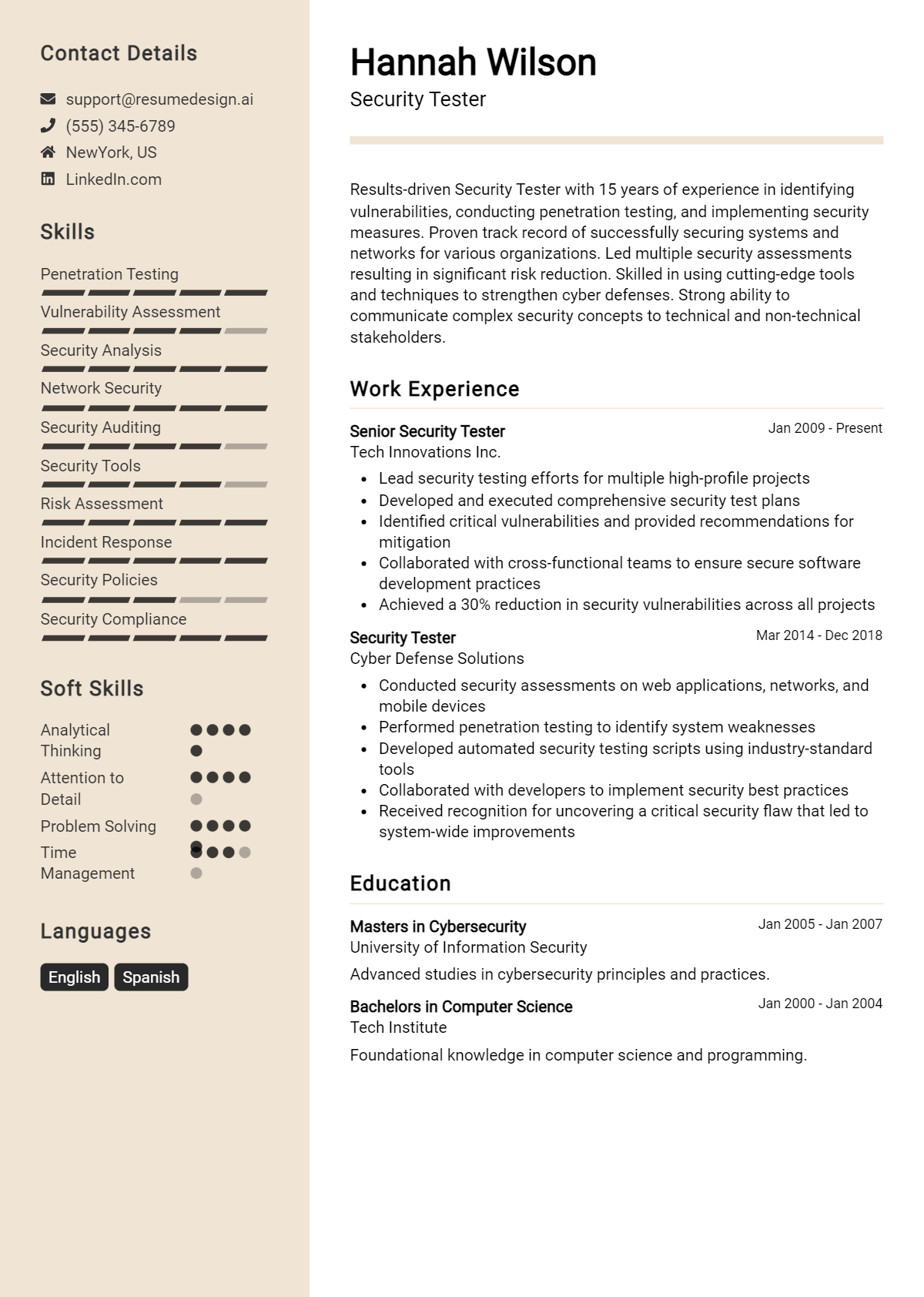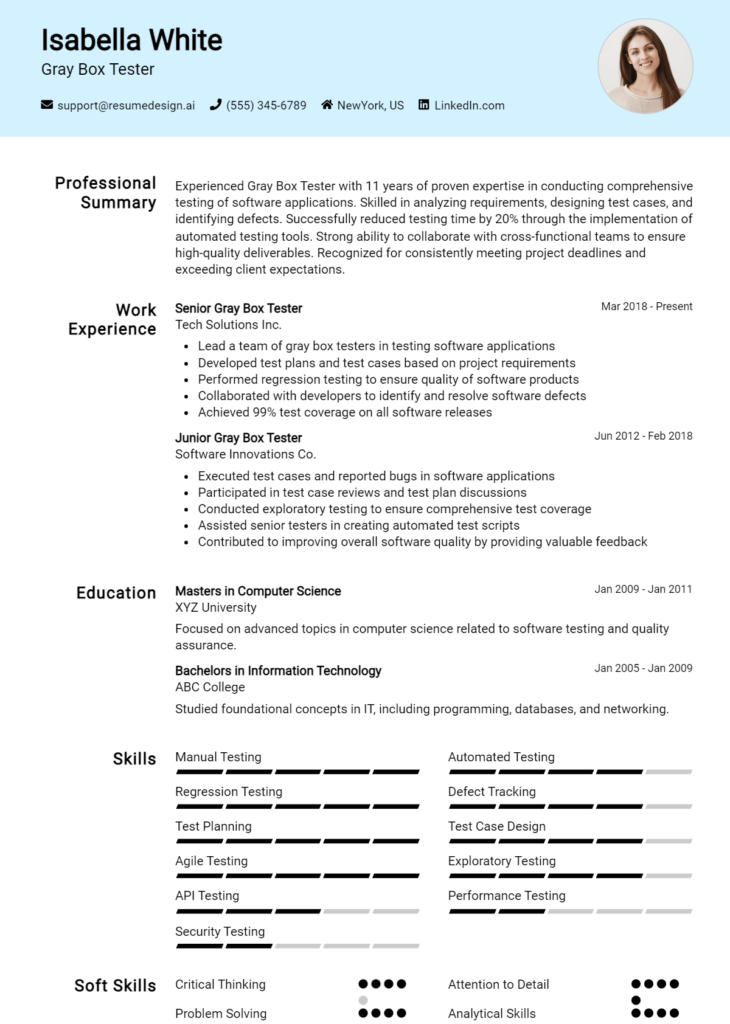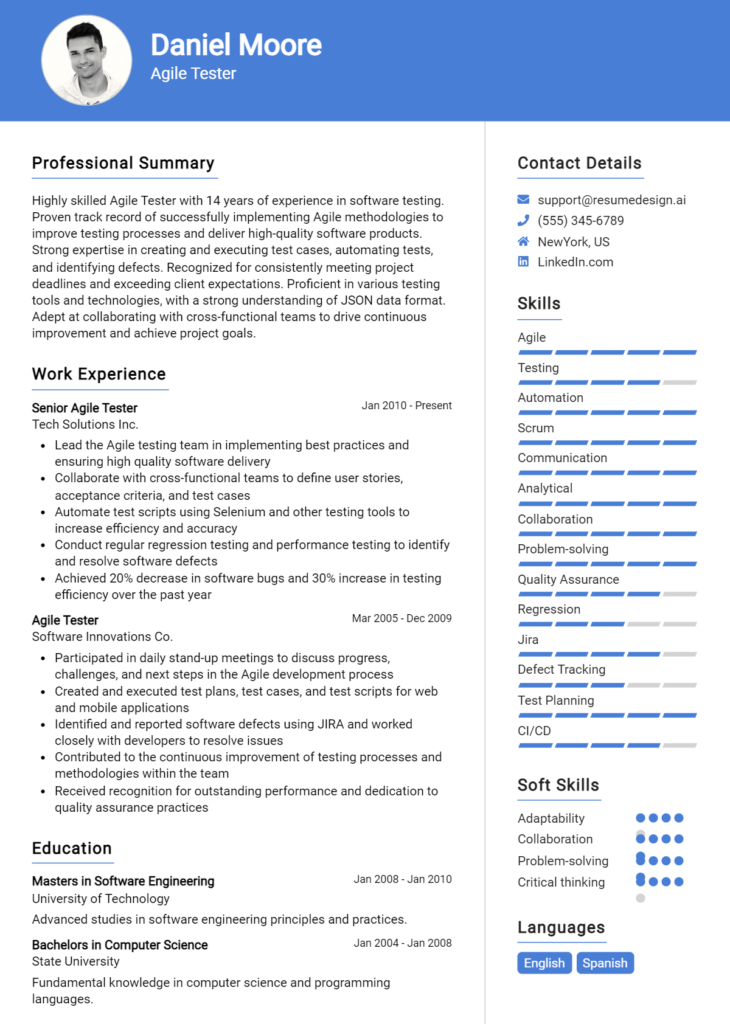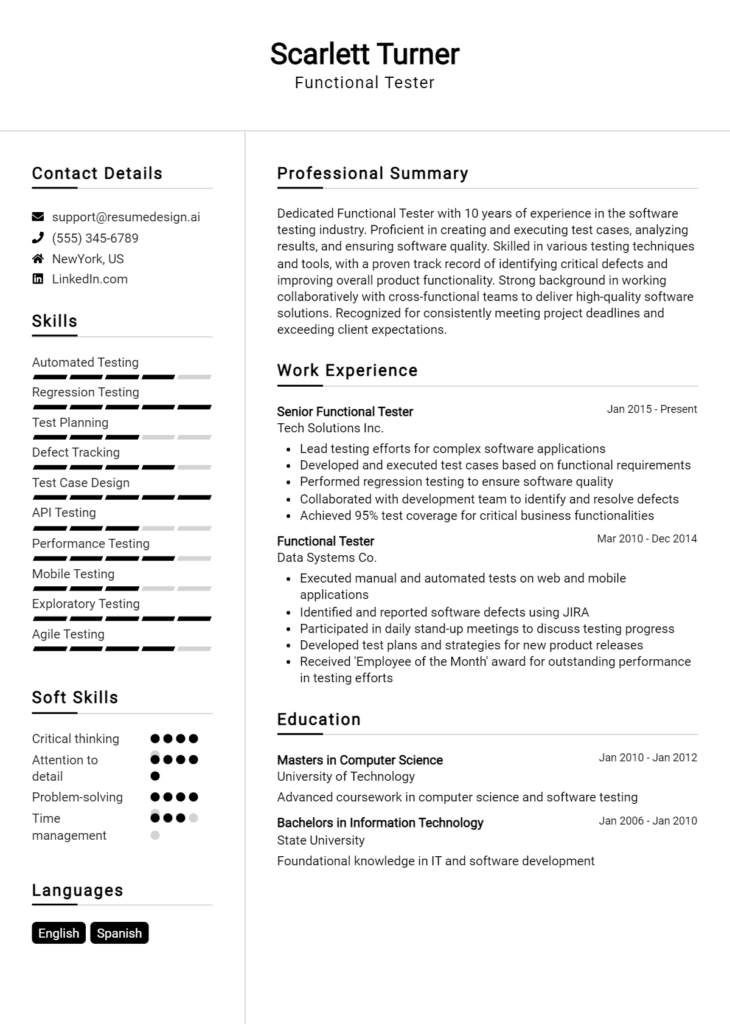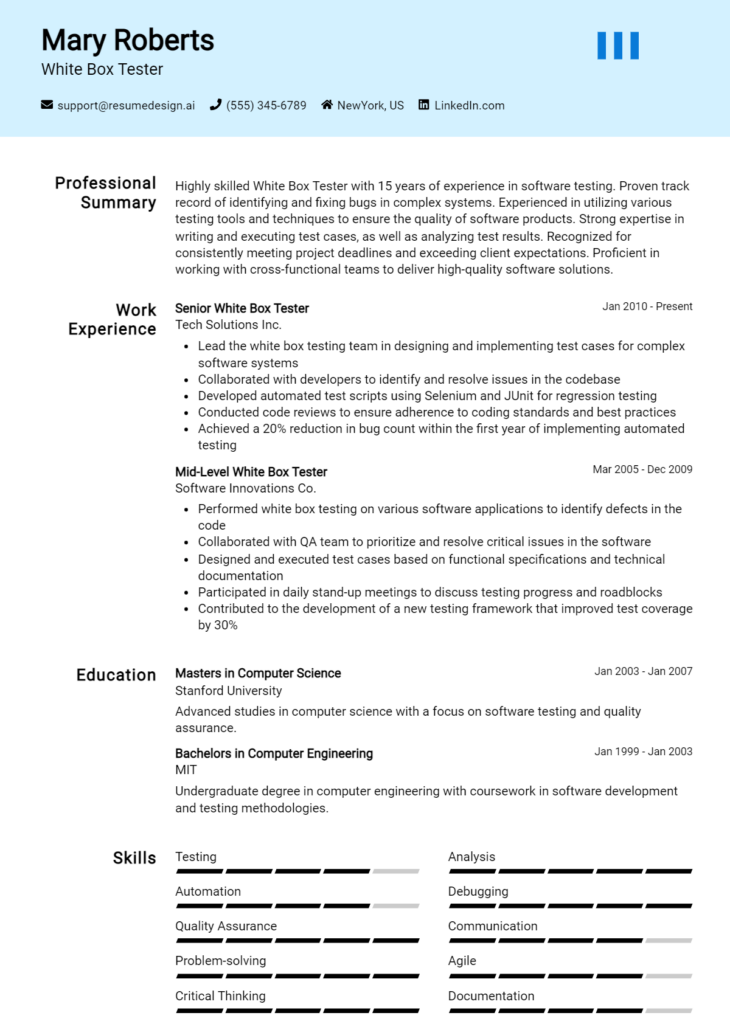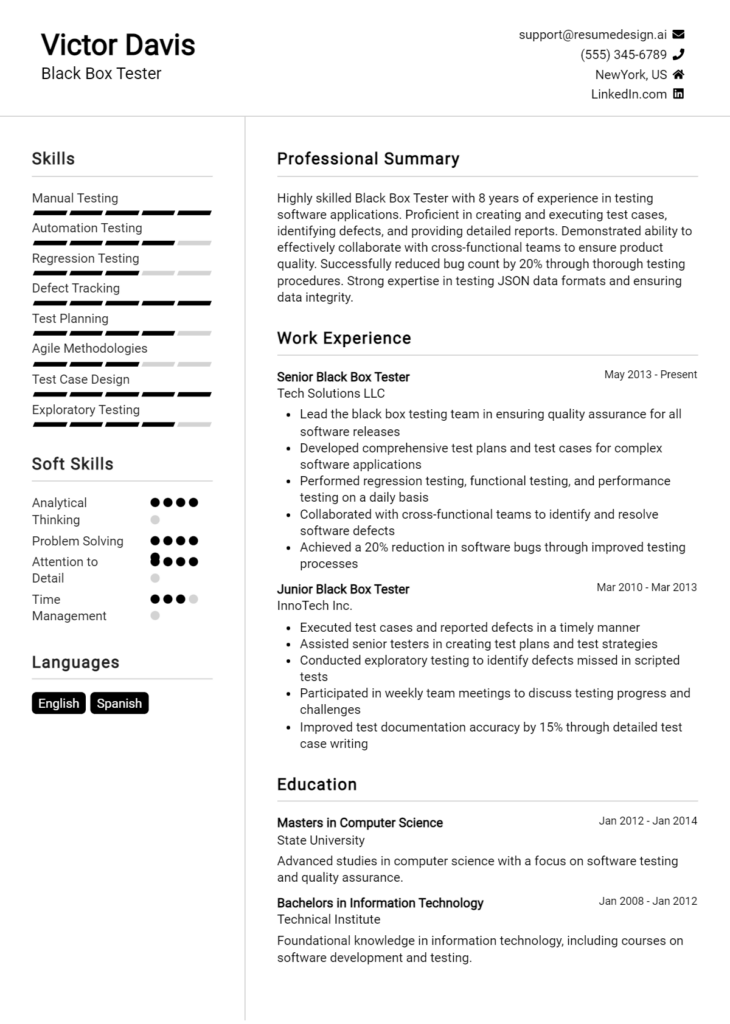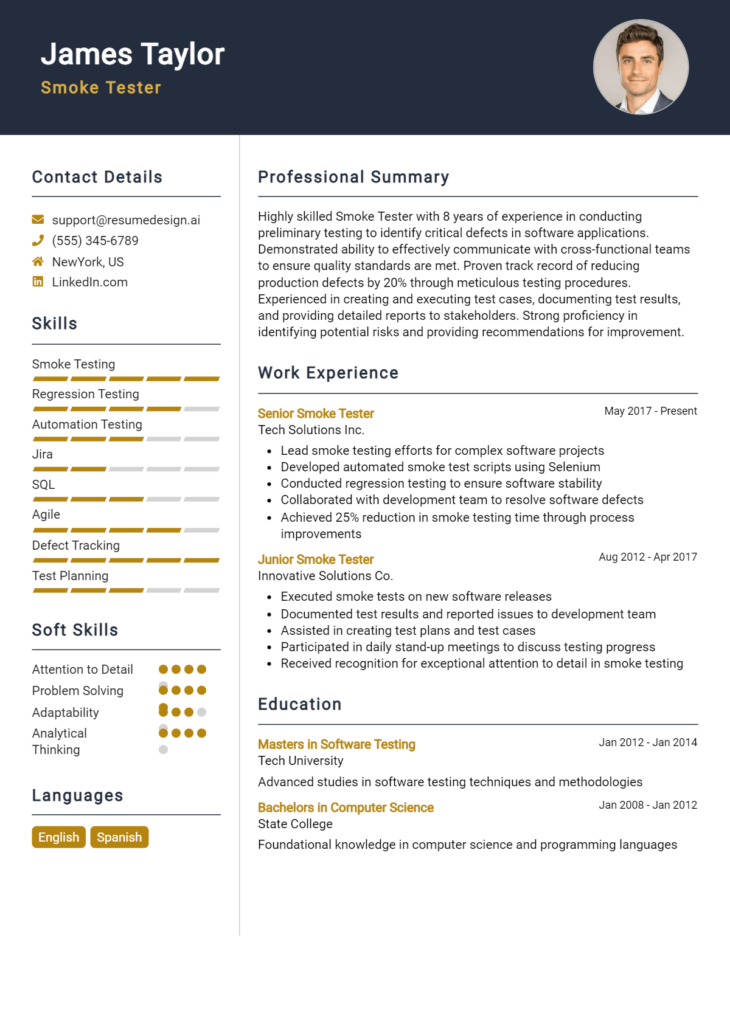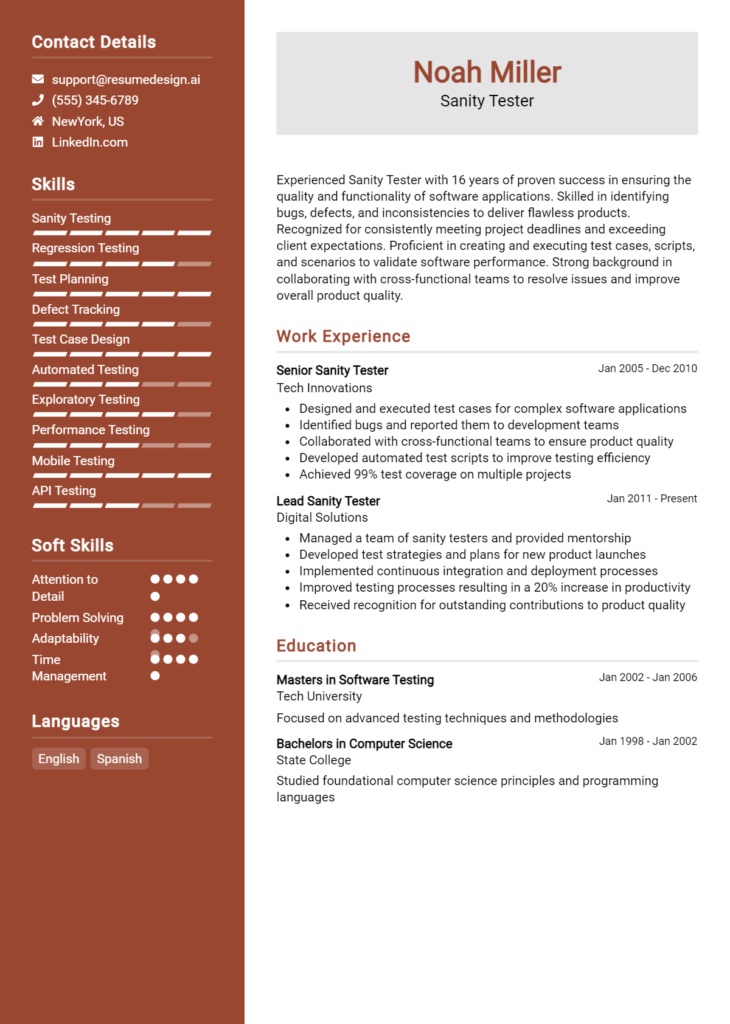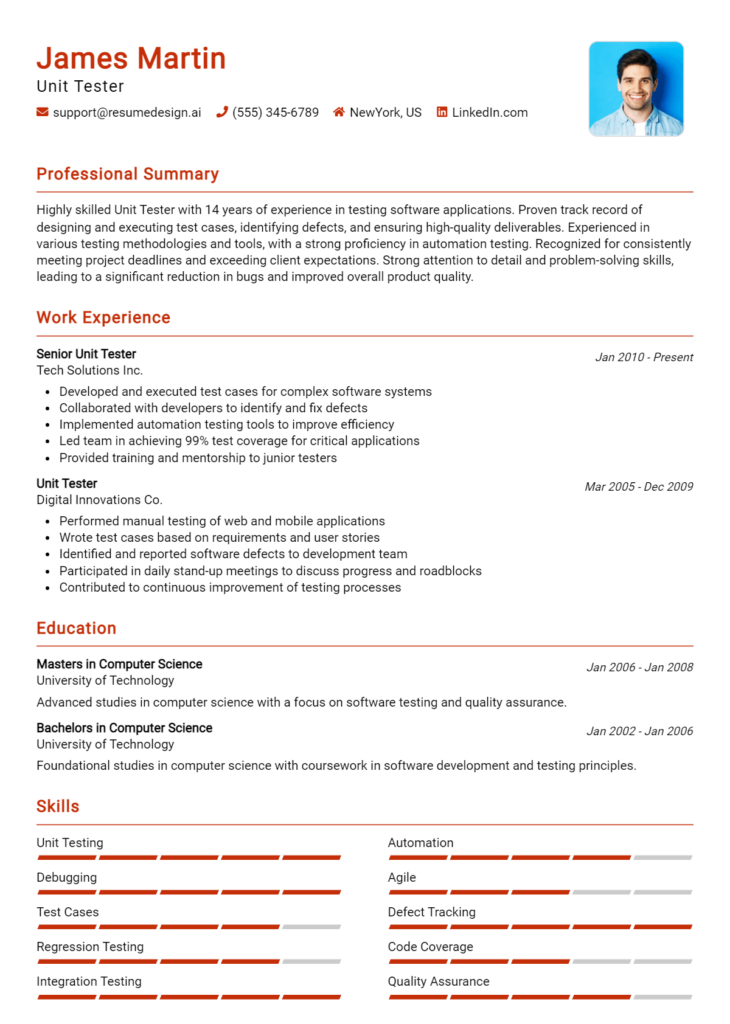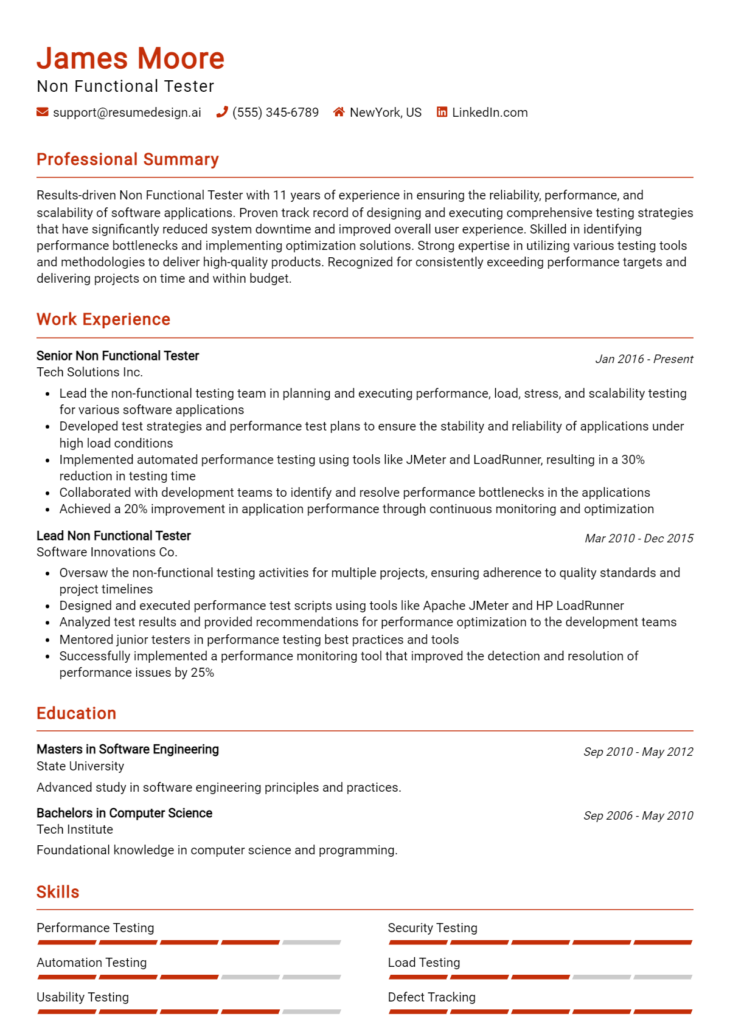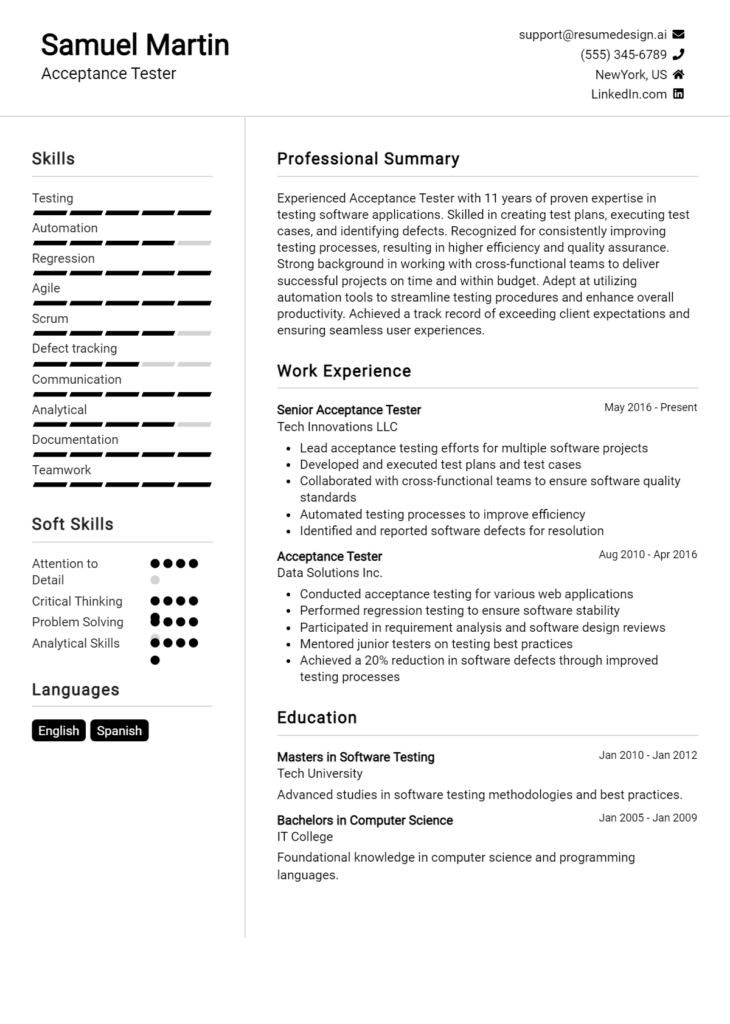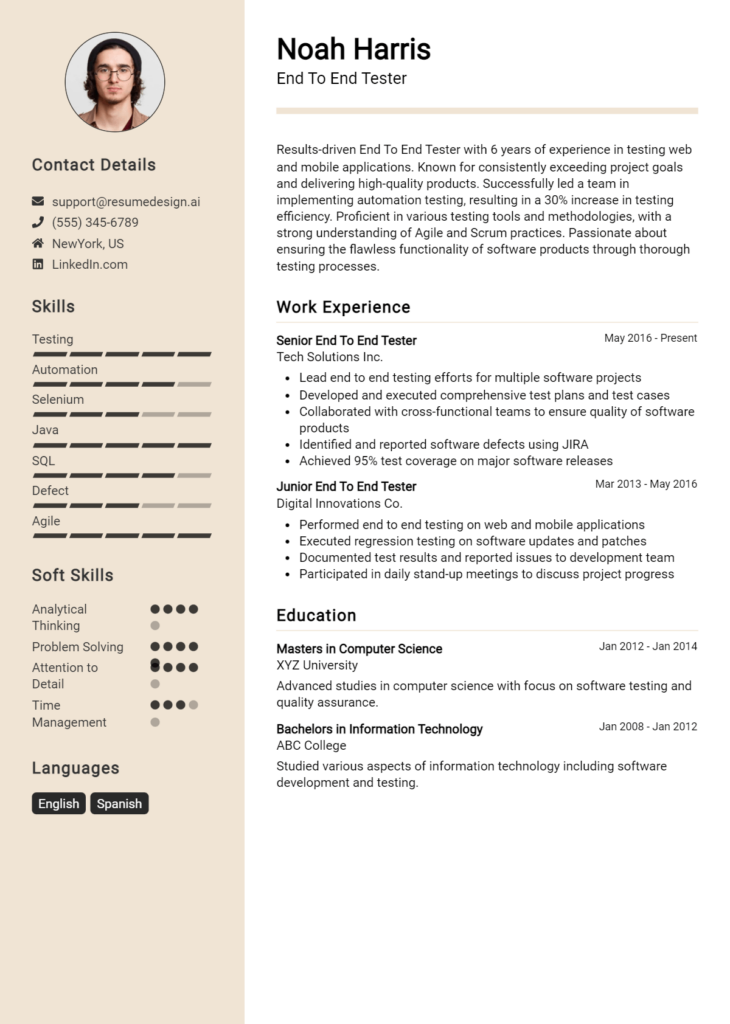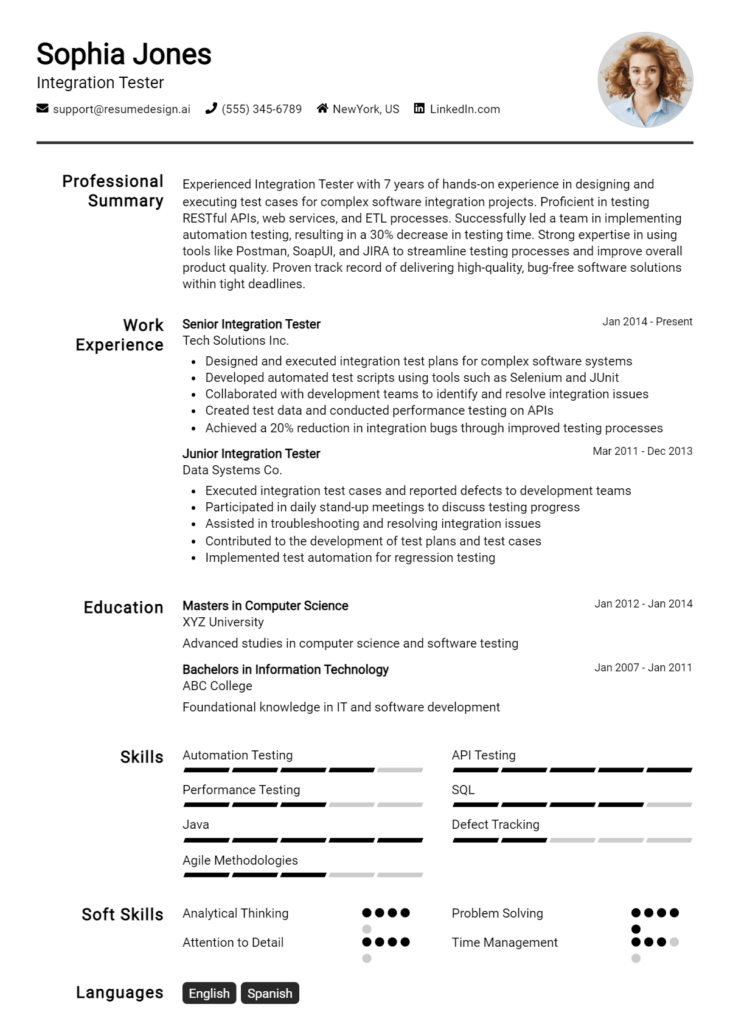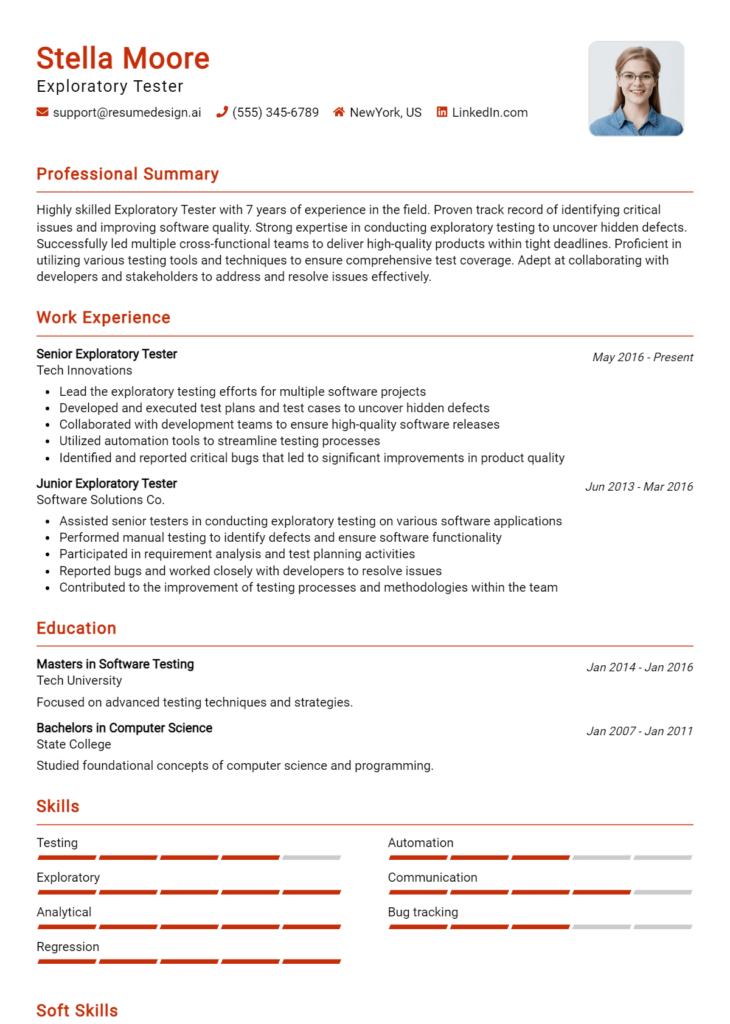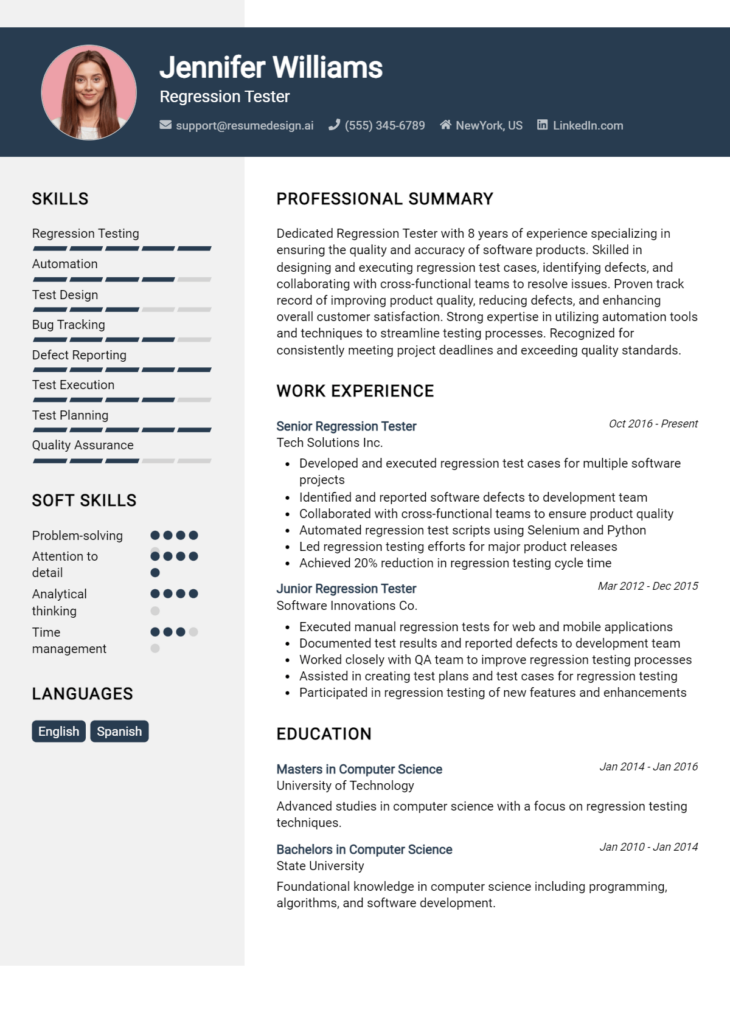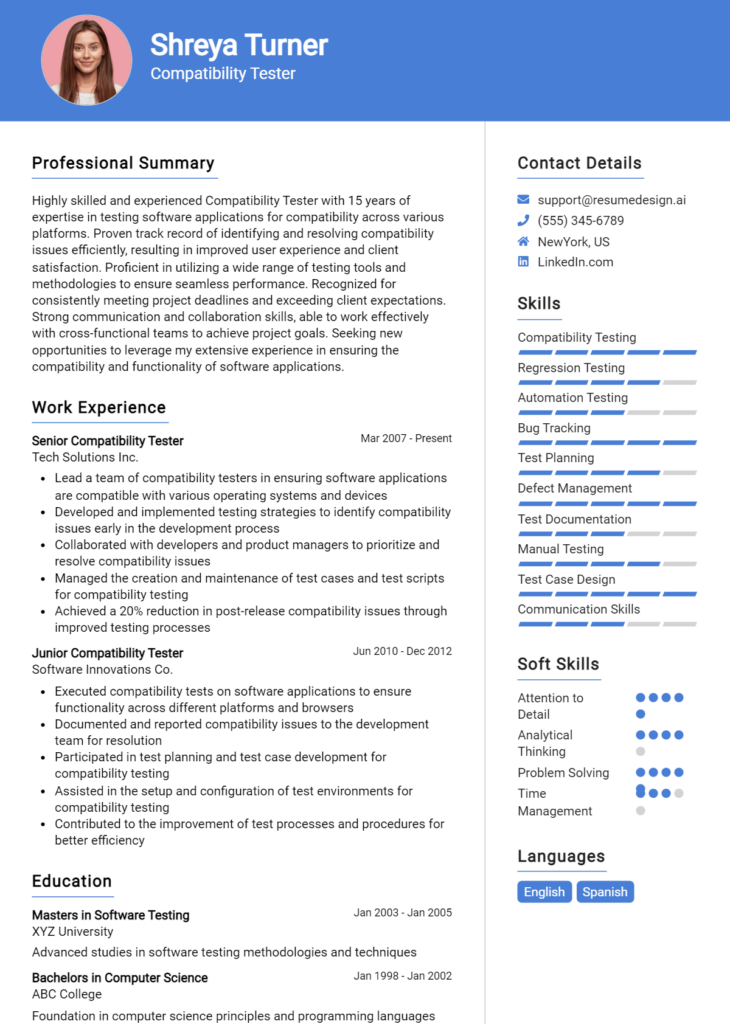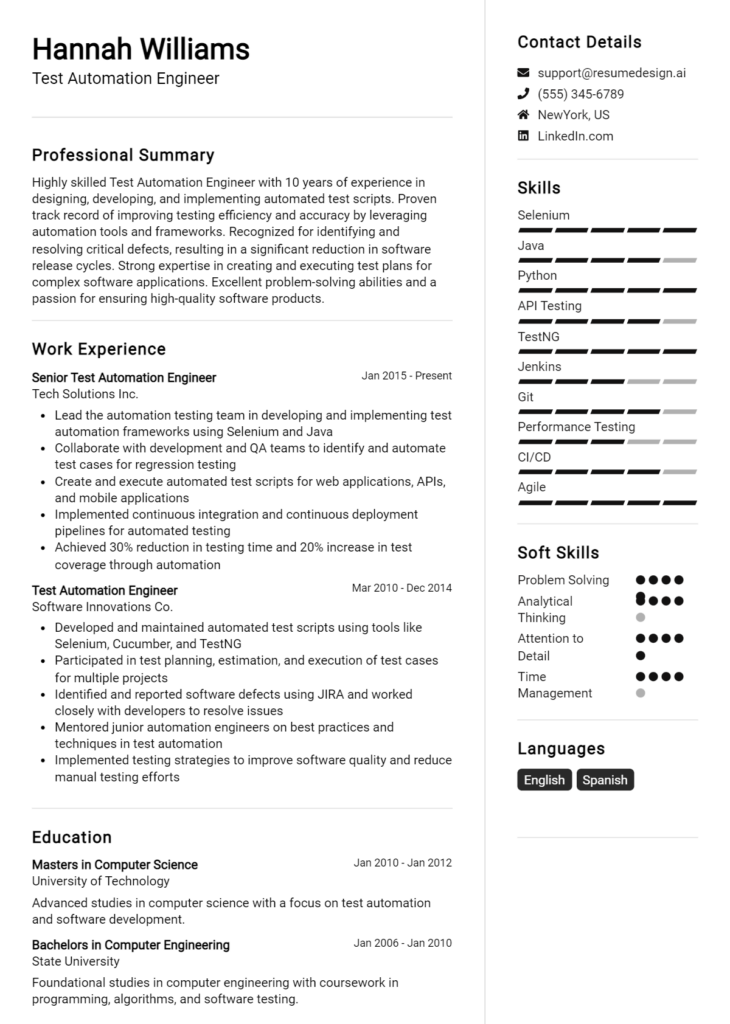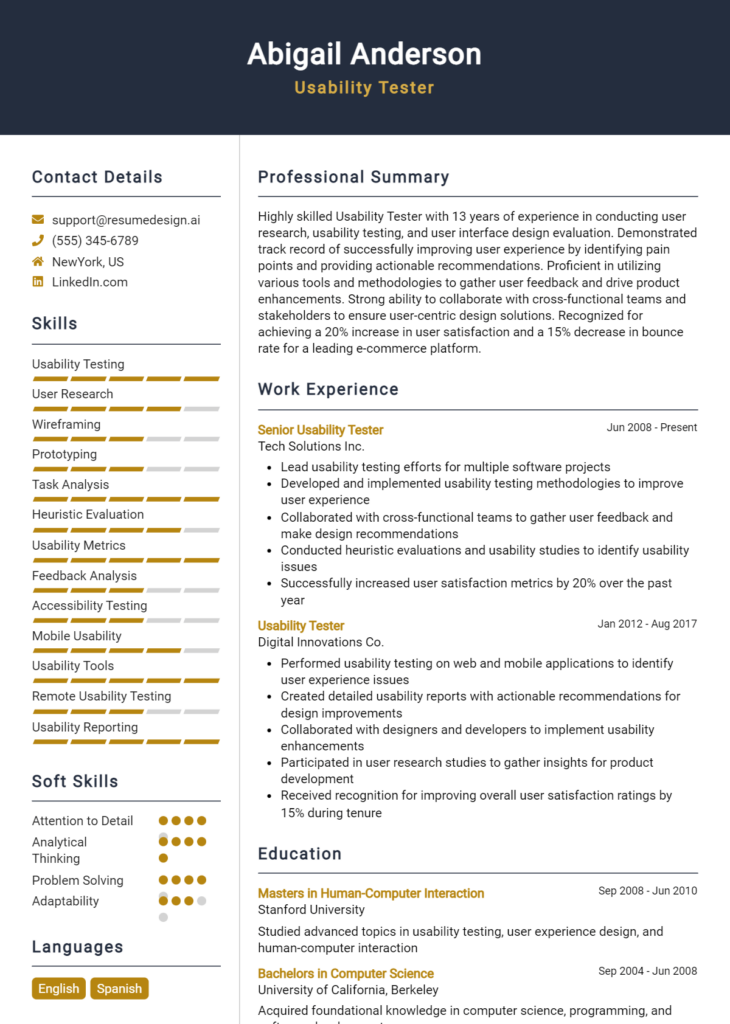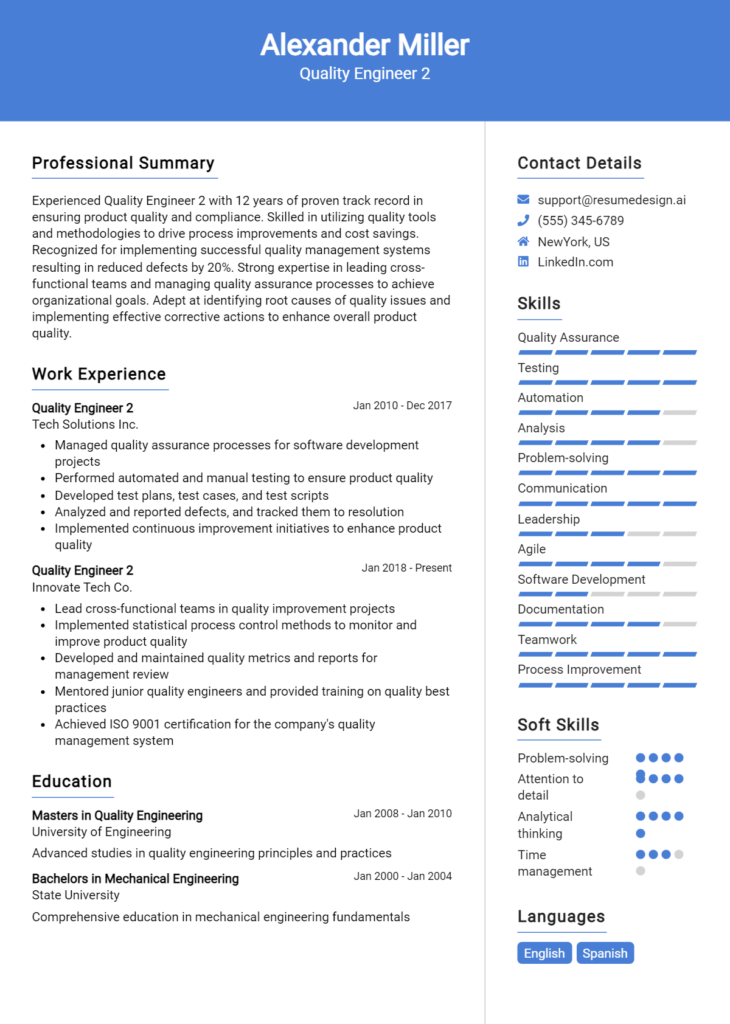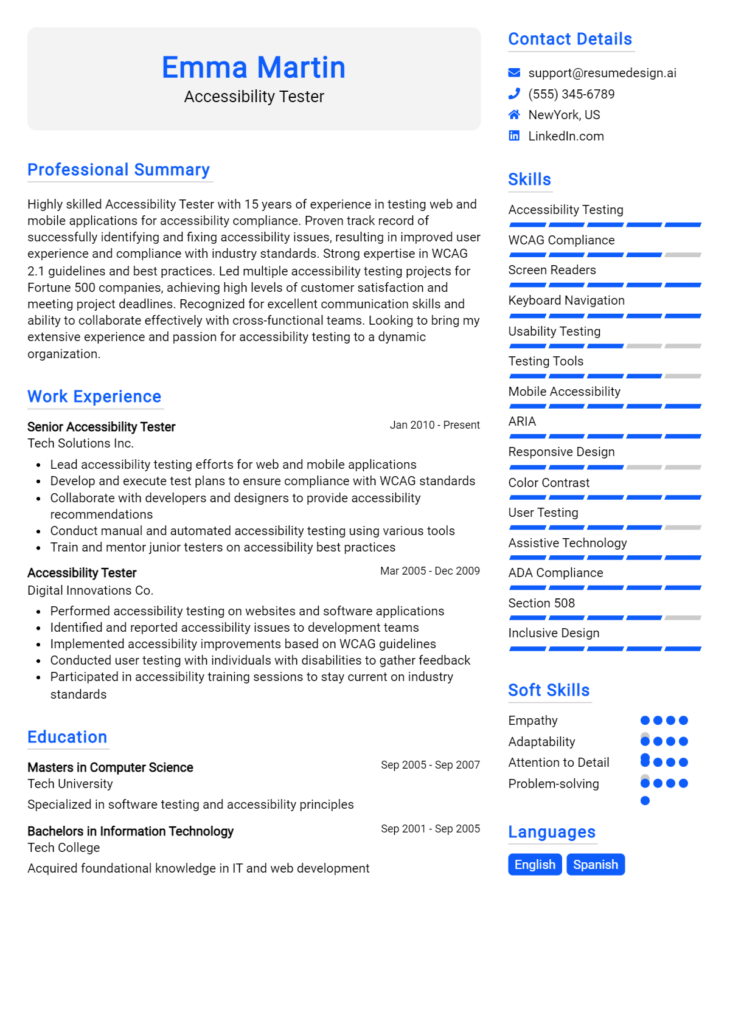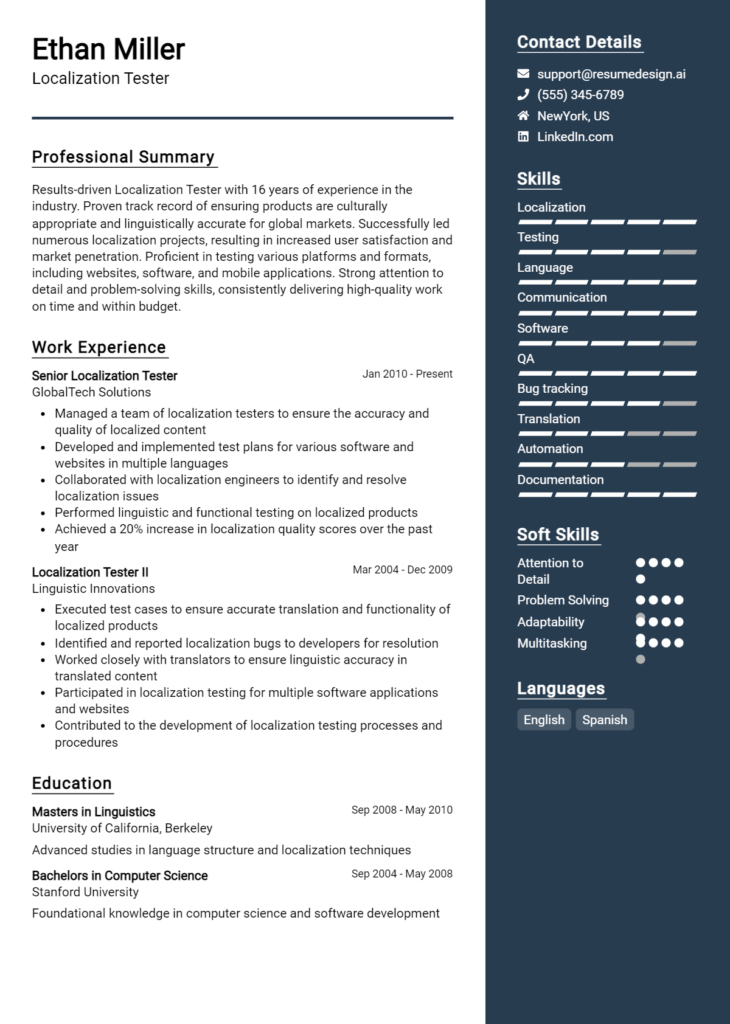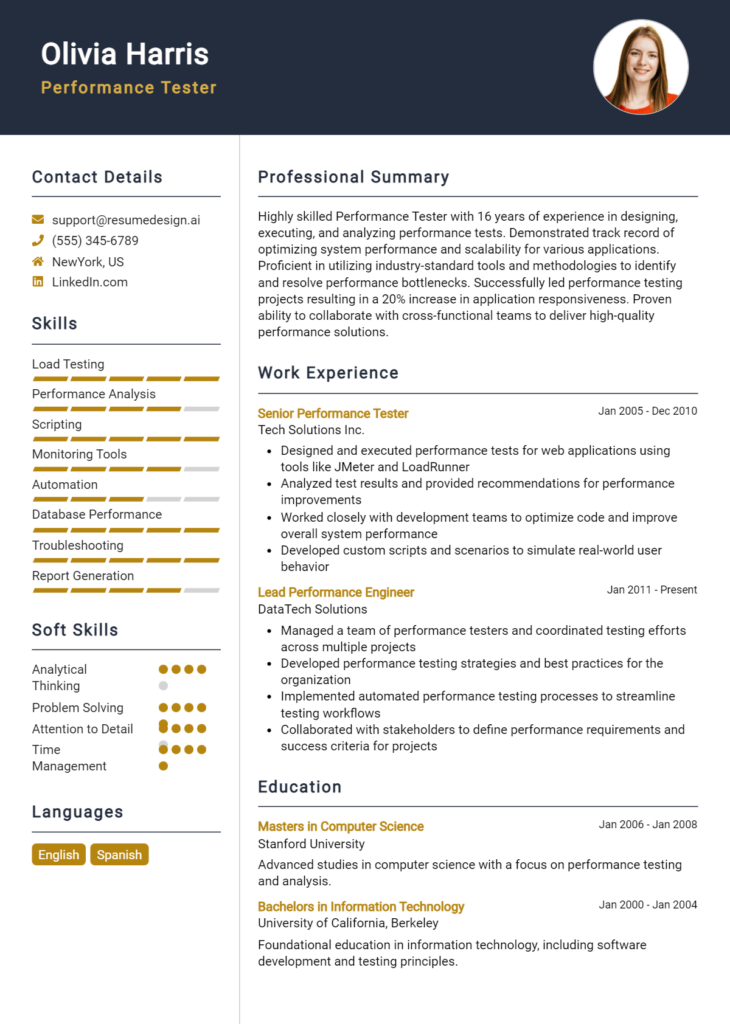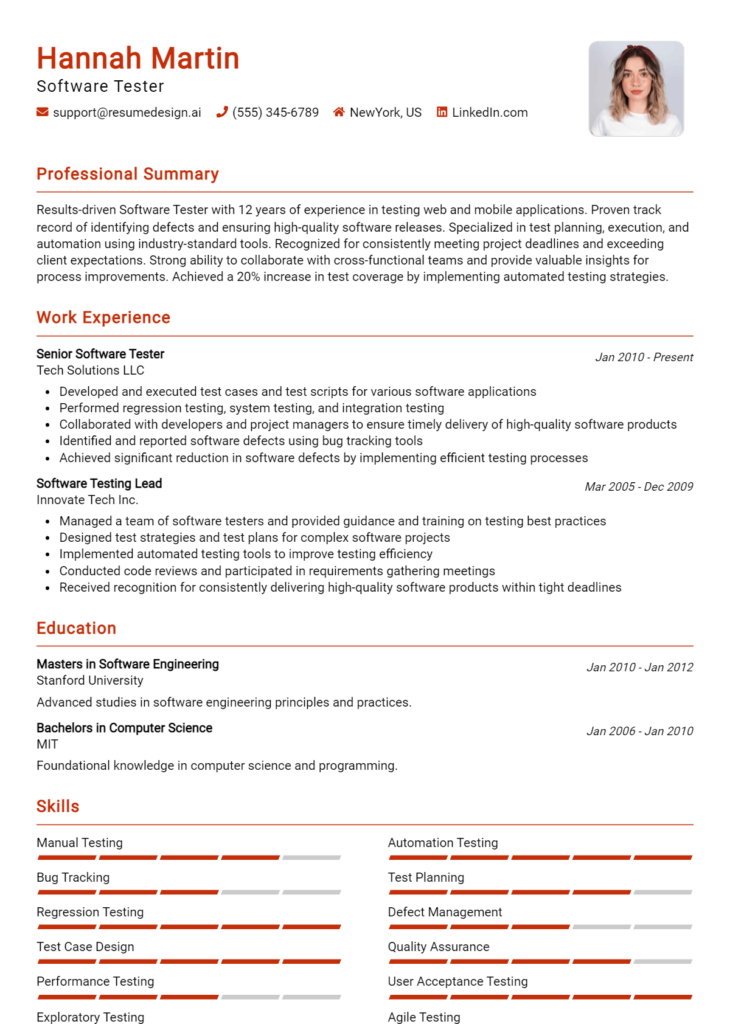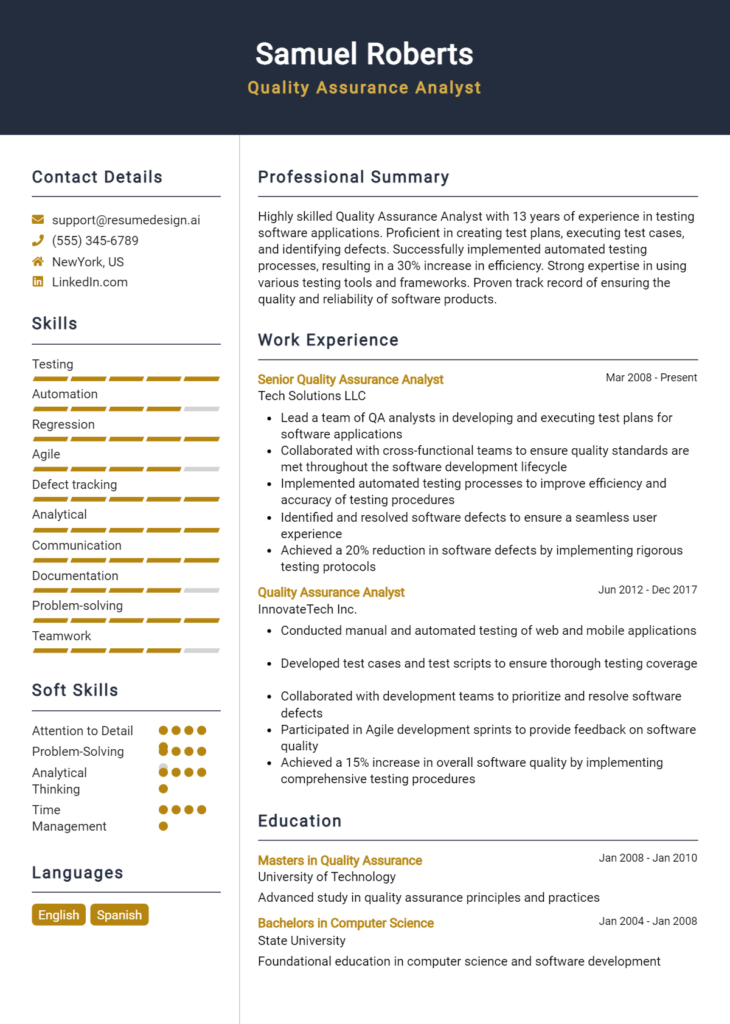Security Tester Core Responsibilities
A Security Tester plays a crucial role in safeguarding an organization's digital assets by identifying vulnerabilities and ensuring robust security measures. This position requires a blend of technical expertise in network protocols, software testing, and risk assessment, along with operational skills in collaboration and communication across departments. Problem-solving abilities are essential to navigate complex security challenges. A well-structured resume that highlights these competencies effectively demonstrates how a Security Tester contributes to achieving the organization's overall security objectives.
Common Responsibilities Listed on Security Tester Resume
- Conducting penetration tests to identify security weaknesses.
- Performing vulnerability assessments and risk analysis.
- Developing and implementing security testing methodologies.
- Collaborating with development and IT teams to enhance security protocols.
- Documenting and reporting security findings and recommendations.
- Staying updated on the latest security threats and technologies.
- Assisting in the development of security policies and procedures.
- Participating in security audits and compliance assessments.
- Educating staff on security best practices.
- Utilizing automated tools for security testing and analysis.
- Reviewing and analyzing security incidents to prevent future occurrences.
High-Level Resume Tips for Security Tester Professionals
In the competitive field of cybersecurity, a well-crafted resume is not just a formality; it's a crucial tool that can open doors to exciting career opportunities for Security Tester professionals. Your resume is often the first impression you make on potential employers, and it must effectively showcase your skills, experiences, and achievements. A strong resume can set you apart from other candidates and demonstrate your value to an organization. In this guide, we will provide practical and actionable resume tips specifically tailored for Security Tester professionals, ensuring that you present your qualifications in the most compelling way possible.
Top Resume Tips for Security Tester Professionals
- Tailor your resume to the specific job description, emphasizing the skills and experiences that align with the role.
- Highlight relevant certifications, such as Certified Ethical Hacker (CEH) or Offensive Security Certified Professional (OSCP), to demonstrate your qualifications.
- Showcase hands-on experience with security testing tools like Burp Suite, Nessus, or Metasploit, detailing how you've applied them in real-world scenarios.
- Quantify your achievements; for example, mention the percentage of vulnerabilities you identified or the number of successful security audits you conducted.
- Include a dedicated skills section that lists industry-specific competencies, such as penetration testing, vulnerability assessment, and risk management.
- Use action verbs and concise language to describe your responsibilities and accomplishments, making it easy for employers to scan your resume.
- Incorporate keywords from the job posting to improve your chances of passing through Applicant Tracking Systems (ATS).
- Provide examples of collaborative projects with cross-functional teams to highlight your ability to work effectively in a team-oriented environment.
- Keep your formatting clean and professional, ensuring that your resume is easy to read and visually appealing.
By implementing these tips, you can significantly enhance your chances of landing a job in the Security Tester field. A well-optimized resume not only highlights your qualifications but also captures the attention of hiring managers, increasing the likelihood of securing interviews and advancing your career in cybersecurity.
Why Resume Headlines & Titles are Important for Security Tester
In the competitive field of cybersecurity, the role of a Security Tester is crucial for safeguarding sensitive information and ensuring system integrity. A well-crafted resume headline or title serves as the first impression for hiring managers, immediately capturing their attention and summarizing a candidate's key qualifications in a succinct and impactful manner. A strong headline not only highlights relevant skills and experiences but also aligns directly with the job being applied for, making it easier for recruiters to identify top candidates. By being concise and relevant, the headline sets the tone for the rest of the resume, making it essential for job seekers to invest time in developing an effective title.
Best Practices for Crafting Resume Headlines for Security Tester
- Keep it concise, ideally 5-10 words.
- Use role-specific keywords that match the job description.
- Highlight your most relevant skills or certifications.
- Include quantifiable achievements, if applicable.
- Make it action-oriented to convey proactivity.
- Avoid generic phrases and cliched terms.
- Tailor your headline for each job application.
- Ensure clarity and readability for quick comprehension.
Example Resume Headlines for Security Tester
Strong Resume Headlines
Experienced Security Tester with 5+ Years in Vulnerability Assessment
Certified Ethical Hacker Specializing in Penetration Testing
Results-Driven Security Analyst with Proven Track Record in Threat Mitigation
Dynamic Cybersecurity Professional with Expertise in Compliance Audits
Weak Resume Headlines
Looking for a Job
Security Tester
IT Professional Seeking Opportunities
Strong resume headlines are effective because they are specific, action-oriented, and highlight the candidate’s unique qualifications related to the position. They provide hiring managers with immediate insight into the candidate’s capabilities and relevance to the role. In contrast, weak headlines fail to impress due to their vagueness and lack of relevant detail, which leaves hiring managers unsure of the candidate’s qualifications and potential contributions. By focusing on clarity and specificity, strong headlines enhance the overall impact of a resume, making it more likely to stand out in a crowded field.
Writing an Exceptional Security Tester Resume Summary
A well-crafted resume summary is crucial for a Security Tester, as it serves as the first impression a hiring manager has of a candidate's qualifications. An exceptional summary quickly captures attention by succinctly showcasing key skills, relevant experience, and notable accomplishments that align with the job role. It should be concise and impactful, tailored specifically to the job description to demonstrate a clear understanding of what the employer is seeking. This strategic approach not only highlights the candidate's expertise but also sets the tone for the rest of the resume, making it a vital component of any job application in the competitive field of security testing.
Best Practices for Writing a Security Tester Resume Summary
- Quantify Achievements: Use numbers and metrics to highlight your impact, such as the percentage of vulnerabilities identified or reduced incident response time.
- Focus on Relevant Skills: Emphasize core skills related to security testing, such as penetration testing, risk assessment, and familiarity with security tools.
- Tailor to the Job Description: Customize your summary to reflect the specific qualifications and requirements mentioned in the job posting.
- Keep It Concise: Aim for 2-4 sentences that convey value without overwhelming the reader.
- Highlight Certifications: Include relevant certifications like CEH, CISSP, or OSCP to validate your expertise.
- Use Action-Oriented Language: Start sentences with strong action verbs to convey your accomplishments and contributions effectively.
- Showcase Problem-Solving Skills: Mention specific incidents where you identified and mitigated security threats.
- Maintain Professional Tone: Ensure the language is formal and focused on professionalism to align with industry standards.
Example Security Tester Resume Summaries
Strong Resume Summaries
Results-driven Security Tester with over 5 years of experience in identifying vulnerabilities and enhancing security protocols. Successfully reduced security breaches by 40% through rigorous penetration testing and proactive risk assessments.
Detail-oriented Security Tester with expertise in automated testing tools and a proven track record of improving incident response times by 30%. Holds a CEH certification and has led multiple security audits for Fortune 500 companies.
Accomplished Security Tester specializing in threat modeling and vulnerability assessments. Achieved a 95% success rate in identifying potential security flaws, leading to the implementation of key safeguards that reduced system risks significantly.
Dedicated Security Tester with extensive experience in both manual and automated testing. Developed and executed security test plans that resulted in a 50% increase in defect detection rates, ensuring compliance with industry standards.
Weak Resume Summaries
Experienced professional looking for a security testing position. I have skills in security tools and testing.
Motivated Security Tester with some experience in the field. I know a bit about security protocols and want to contribute to a team.
The strong resume summaries effectively highlight specific achievements, quantify results, and showcase relevant skills, making them impactful and tailored to the Security Tester role. In contrast, the weak summaries lack detail, fail to provide measurable outcomes, and come across as generic, which does not engage the hiring manager or demonstrate the candidate's true potential in the field.
Work Experience Section for Security Tester Resume
The work experience section of a Security Tester resume is crucial in demonstrating a candidate's technical skills, leadership capabilities, and commitment to delivering high-quality products. It serves as a platform to showcase not only the technical expertise gained through various roles but also the ability to manage teams and collaborate effectively with stakeholders. By quantifying achievements and aligning experiences with industry standards, candidates can illustrate their impact on previous projects, making them more attractive to potential employers.
Best Practices for Security Tester Work Experience
- Highlight relevant technical skills specific to security testing, such as penetration testing, vulnerability assessment, and risk analysis.
- Quantify achievements using metrics, such as the percentage of vulnerabilities identified, reduced incident response time, or improved security compliance ratings.
- Demonstrate leadership by detailing experiences where you led a team or a project, emphasizing decision-making and strategic planning.
- Showcase collaboration by mentioning cross-functional teams you have worked with, including developers and system administrators.
- Use industry-specific terminology and frameworks, such as OWASP, NIST, or ISO 27001, to align your experience with recognized standards.
- Include continuous learning and certifications relevant to security testing to reflect commitment to professional growth.
- Tailor your experiences to the job description, ensuring that key responsibilities and achievements align with the prospective employer's needs.
- Utilize action verbs to convey a sense of proactivity and impact, such as "executed," "developed," or "implemented."
Example Work Experiences for Security Tester
Strong Experiences
- Led a security testing team that identified and remediated 95% of vulnerabilities in the application, resulting in a 50% decrease in security incidents over one year.
- Developed and implemented a comprehensive penetration testing framework that improved the overall security posture of the organization, achieving compliance with ISO 27001 standards.
- Collaborated with cross-functional teams to deliver a secure software product that passed all security audits, leading to a 30% increase in customer trust ratings.
- Conducted over 100 vulnerability assessments, providing detailed reports that reduced the average remediation time by 40% through prioritized risk management.
Weak Experiences
- Worked on security testing for various projects.
- Helped identify some vulnerabilities in applications.
- Participated in team meetings to discuss security issues.
- Performed testing tasks as assigned.
The examples provided illustrate the differences between strong and weak experiences in a Security Tester resume. Strong experiences are characterized by specific accomplishments, quantifiable results, and clear demonstrations of leadership and collaboration, which effectively highlight the candidate's value. In contrast, weak experiences fail to provide substantial detail or measurable outcomes, leaving potential employers with a vague understanding of the candidate's contributions and capabilities.
Education and Certifications Section for Security Tester Resume
The education and certifications section is a crucial component of a Security Tester resume as it underscores the candidate's academic background and professional qualifications in the field of cybersecurity. This section not only showcases relevant degrees but also highlights industry-recognized certifications that can significantly enhance the candidate's credibility. Furthermore, continuous learning efforts demonstrated through specialized training and relevant coursework signal to potential employers that the candidate is committed to staying current with evolving security practices and technologies. By providing a well-structured education and certifications section, candidates can effectively align their qualifications with the job role and stand out in a competitive job market.
Best Practices for Security Tester Education and Certifications
- Prioritize relevant degrees, such as Computer Science, Information Technology, or Cybersecurity.
- Include industry-recognized certifications like Certified Ethical Hacker (CEH), CompTIA Security+, or Certified Information Systems Security Professional (CISSP).
- List any specialized training or workshops that focus on security testing tools and methodologies.
- Provide specific coursework related to network security, penetration testing, and vulnerability assessment.
- Keep the section concise and directly related to the security testing role.
- Highlight any advanced degrees, such as a Master’s in Cybersecurity, that may enhance your qualifications.
- Ensure that the certifications listed are current and relevant to the latest industry standards.
- Consider including professional development courses that demonstrate a commitment to continuous learning.
Example Education and Certifications for Security Tester
Strong Examples
- Bachelor of Science in Cybersecurity, University of ABC, 2021
- Certified Ethical Hacker (CEH), EC-Council, 2022
- CompTIA Security+, CompTIA, 2023
- Advanced Penetration Testing Course, Cybersecurity Institute, 2023
Weak Examples
- Bachelor of Arts in English Literature, University of XYZ, 2019
- Certification in Basic Computer Skills, Online Learning Platform, 2020
- Outdated CompTIA A+ Certification, CompTIA, 2018
- High School Diploma, Generic High School, 2015
The strong examples listed are relevant to the field of security testing, showcasing degrees and certifications that align with industry expectations and current practices. They demonstrate a focus on cybersecurity education and the requisite skills needed for a security tester role. Conversely, the weak examples illustrate qualifications that do not pertain to the security domain, such as unrelated degrees and outdated certifications, which could detract from the candidate's overall appeal to hiring managers in the cybersecurity industry.
Top Skills & Keywords for Security Tester Resume
In the competitive field of cybersecurity, a well-crafted resume is essential for a Security Tester to stand out. Highlighting both hard and soft skills can significantly enhance your chances of landing an interview. Hard skills demonstrate your technical proficiency and specific knowledge related to security testing, while soft skills showcase your interpersonal abilities and problem-solving capabilities. Employers look for a balance of both types of skills to ensure that candidates can not only perform their duties effectively but also collaborate well with teams and adapt to evolving challenges in the cybersecurity landscape. To build a compelling resume, it's crucial to incorporate relevant skills and articulate your work experience effectively.
Top Hard & Soft Skills for Security Tester
Soft Skills
- Attention to Detail
- Analytical Thinking
- Problem-Solving
- Communication Skills
- Team Collaboration
- Adaptability
- Time Management
- Critical Thinking
- Creativity
- Ethics and Integrity
Hard Skills
- Penetration Testing
- Vulnerability Assessment
- Security Auditing
- Risk Management
- Knowledge of Security Protocols (e.g., SSL, TLS)
- Familiarity with Security Tools (e.g., Burp Suite, Nessus)
- Understanding of Network Security
- Proficiency in Scripting Languages (e.g., Python, Bash)
- Knowledge of Compliance Standards (e.g., ISO 27001, GDPR)
- Experience with Incident Response and Forensics
- Familiarity with Cloud Security Practices
- Operating System Security (Windows, Linux)
- Database Security Measures
- Network Traffic Analysis
- Security Frameworks (e.g., NIST, OWASP)
Stand Out with a Winning Security Tester Cover Letter
I am writing to express my interest in the Security Tester position at [Company Name], as advertised on [Job Board/Company Website]. With a robust background in cybersecurity and hands-on experience in identifying vulnerabilities and protecting sensitive information, I am excited about the opportunity to contribute to your team. My expertise in penetration testing, risk assessment, and security protocols aligns well with the qualifications you seek, making me a strong candidate for this role.
In my previous position at [Previous Company Name], I successfully conducted security assessments and vulnerability scans that significantly improved the organization’s security posture. I collaborated with cross-functional teams to implement security measures and developed comprehensive reports that outlined potential risks and provided actionable recommendations. My proficiency in tools such as Burp Suite, OWASP ZAP, and Metasploit has equipped me with the skills necessary to detect and mitigate threats effectively. Additionally, my commitment to staying updated on the latest cybersecurity trends and threat landscapes ensures that I can proactively address emerging risks.
I am particularly drawn to [Company Name] because of your commitment to innovation and security excellence. I admire your approach to integrating security into the development lifecycle and believe that my background in both manual and automated testing can further enhance your initiatives. I am eager to bring my analytical skills and attention to detail to your esteemed team, ensuring that your systems remain secure against evolving threats.
Thank you for considering my application for the Security Tester position. I look forward to the opportunity to discuss how my skills and experiences align with the needs of [Company Name]. I am confident that my passion for cybersecurity and my dedication to excellence will make a valuable addition to your organization.
Common Mistakes to Avoid in a Security Tester Resume
When crafting a resume for a Security Tester position, it is crucial to present your skills and experiences effectively to stand out in a competitive job market. However, many candidates make common mistakes that can diminish their chances of securing an interview. Understanding these pitfalls can help you create a more impactful resume that highlights your qualifications and expertise in security testing.
Vague Job Descriptions: Failing to provide specific details about your previous roles can leave hiring managers confused about your actual responsibilities and achievements. Use clear language to describe your contributions.
Ignoring Relevant Certifications: Skipping the inclusion of pertinent certifications, such as Certified Ethical Hacker (CEH) or Offensive Security Certified Professional (OSCP), can make you seem less qualified. Make sure to prominently display any relevant credentials.
Overloading with Technical Jargon: While it’s important to demonstrate technical knowledge, overusing industry jargon can alienate HR personnel who may not be familiar with the terms. Strive for a balance between technical detail and readability.
Not Tailoring the Resume: Using a generic resume for multiple applications can dilute your message. Tailor your resume to each specific job by emphasizing the skills and experiences most relevant to the position.
Neglecting Soft Skills: Security testers need strong communication and problem-solving skills. Focusing solely on technical abilities and neglecting to highlight interpersonal skills can lead to an incomplete picture of your qualifications.
Lack of Quantifiable Achievements: Failing to include measurable outcomes for your past work can make your accomplishments seem less impactful. Use statistics or specific results to showcase your effectiveness, such as "reduced vulnerabilities by 30%".
Poor Formatting and Design: A cluttered or unprofessional layout can detract from the content of your resume. Keeping a clean, organized design with clear headings and bullet points enhances readability and professionalism.
Ignoring Continuous Learning: The field of security testing is constantly evolving. Not mentioning any ongoing education or training can suggest that you are not keeping up with industry trends. Highlight any recent courses, workshops, or conferences attended.
Conclusion
As we conclude our exploration of the Security Tester role, it's essential to highlight the critical skills and responsibilities that define this position. Security Testers play a pivotal role in safeguarding an organization’s digital assets by identifying vulnerabilities and ensuring compliance with security standards. Key competencies include proficiency in penetration testing, familiarity with security tools, and a strong understanding of secure coding practices. Continuous learning is vital, given the ever-evolving landscape of cybersecurity threats.
To ensure you're effectively showcasing your expertise and experiences in your resume, we encourage you to take a moment to review your current Security Tester resume. Highlight your technical skills, relevant certifications, and any significant projects you've undertaken.
For those looking to enhance their job application documents, there are several resources available that can help you create a compelling resume and cover letter. Consider using resume templates for a polished look, or try out the resume builder for a user-friendly experience. Additionally, browsing through resume examples can provide inspiration and guidance on how to structure your information effectively. Don't forget the importance of a well-crafted introduction with the help of cover letter templates that can complement your resume nicely.
Take action today and refine your application materials to stand out in the competitive field of cybersecurity. Your future as a Security Tester awaits!

